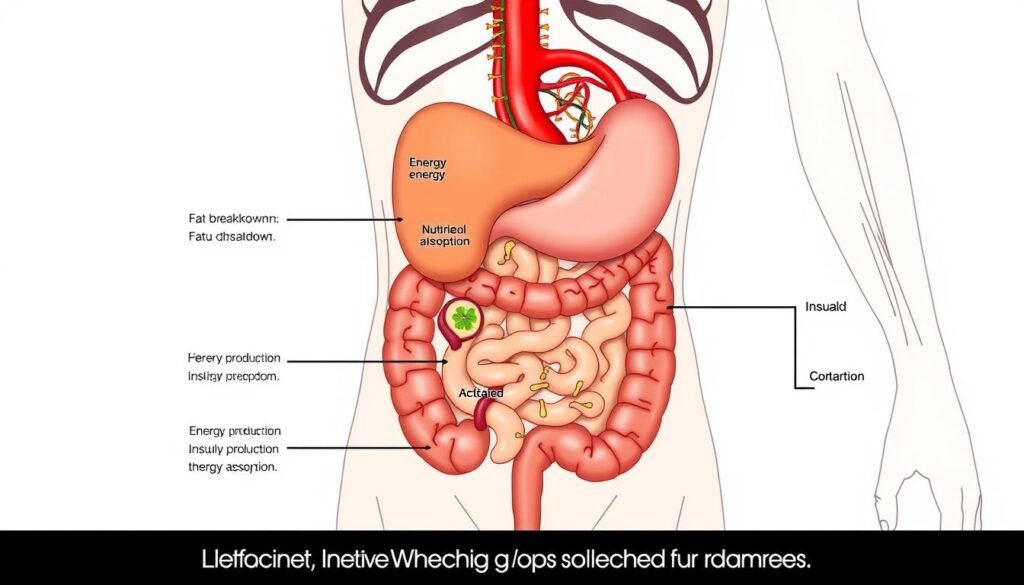For years, I struggled with my weight. It felt like a never-ending battle, one that left me frustrated and defeated. No matter how hard I tried, the results were temporary. Sound familiar? You’re not alone. Studies show that 95% of people who lose weight regain it within a few years or months1. This isn’t just about numbers on a scale—it’s about understanding why traditional methods often fail.
Conventional advice like “eat less and move more” overlooks critical factors like metabolism and hormone imbalances. A 2021 review found that resistance training for at least 4 weeks may help decrease body fat by an average of 1.46%2. But it’s not just about exercise. It’s about creating sustainable habits that work for your body and lifestyle.
My journey taught me that lasting weight loss isn’t just about calories. It’s about understanding your body, building healthy habits, and finding what works for you. Let’s explore how to make this a reality.
Key Takeaways
- 95% of people regain lost weight within a few years1.
- Resistance training can reduce body fat by 1.46% in 4 weeks2.
- Traditional advice often ignores metabolism and hormones.
- Weight loss is about sustainable habits, not just calorie counting.
- Understanding your body is key to long-term success.
Recognizing the Limitations of Conventional Weight Loss Strategies
The journey to weight loss is often misunderstood due to oversimplified strategies. Many people believe that following generic advice like “eat less and move more” will lead to success. However, this approach fails to account for individual differences in metabolism, hormones, and lifestyle3.
The One-Size-Fits-All Problem
Generic weight loss advice doesn’t work for everyone. A study found that more than 50% of lost weight is regained within two years, and by five years, over 80% is regained3. This highlights the disconnect between knowing what to do and actually achieving lasting results.
For example, one person might thrive on a low-carb diet, while another sees better results with a higher protein intake. The key is to understand your body’s unique needs rather than following a cookie-cutter plan.
Why “Eat Less and Move More” Often Fails
The “eat less and move more” model overlooks critical factors like appetite and metabolism. After weight loss, appetite increases by about 100 kcal/day, and calorie expenditure decreases by 20–30 kcal/day per kilogram lost3. This makes it harder to maintain results without addressing these changes.
Additionally, environmental constraints, such as access to healthy food or time for exercise, play a significant role. As Nerd Fitness points out, these factors are often ignored in traditional advice.
“Prevention of weight regain requires about 300–500 kcal/day of increased persistent effort to counteract the slowing metabolism and increased appetite.”3
| Strategy | Success Rate | Key Challenges |
|---|---|---|
| Generic Diet Plans | Low | Ignores individual differences |
| Increased Exercise | Moderate | Time and access constraints |
| Behavioral Changes | High | Requires ongoing effort |
Understanding these limitations is the first step toward finding a sustainable way to lose weight. It’s not just about cutting calories or hitting the gym—it’s about creating a plan that works for your unique body and life.
The Science Behind Metabolism and Hormonal Balance
Metabolism and hormones are often overlooked in traditional weight loss plans. Yet, they play a critical role in how your body manages weight. Understanding these factors can help you create a personalized approach to losing weight and maintaining results.

Understanding Thyroid Function and Resting Metabolic Rate
Your thyroid gland regulates your resting metabolic rate (RMR), which determines how many calories your body burns at rest. The T3 hormone, produced by the thyroid, is essential for this process. When thyroid function is impaired, it can slow down your metabolism, making it harder to lose weight4.
For example, a study found that people with hypothyroidism (low thyroid function) often struggle with weight gain, even when following a strict diet4. This highlights the importance of addressing thyroid health in any weight loss plan.
How Hormone Imbalances Affect Weight Gain
Hormones like leptin and insulin also play a significant role in weight management. Leptin signals your brain when you’re full, while insulin helps regulate blood sugar levels. Imbalances in these hormones can lead to increased appetite and fat storage5.
For instance, leptin resistance can make it difficult for your brain to recognize when you’re full, leading to overeating. Similarly, insulin resistance can cause your body to store more fat, even if you’re eating less5. Addressing these imbalances is key to sustainable weight loss.
“Hormonal imbalances can significantly impact your ability to lose weight, making it essential to address these factors in your plan.”
By understanding the science behind metabolism and hormones, you can take a more effective approach to weight loss. It’s not just about cutting calories—it’s about creating a plan that works for your unique body.
Overcoming Fat Forever: My Journey to Lasting Weight Loss
Breaking free from old habits was the turning point in my weight loss journey. Despite discouraging statistics, I realized that lasting change was possible. It wasn’t just about the number on the scale—it was about rewriting the story I told myself about my body and my life.

Recognizing and Breaking Harmful Habits
For years, I followed the same patterns: restrictive diets, inconsistent exercise, and self-doubt. These habits didn’t lead to lasting results. Instead, they created a cycle of frustration and weight gain. Research shows that off-and-on loosening of dietary rules contributes to plateaus in weight loss6.
I decided to take a different approach. I focused on small, sustainable changes. For example, I replaced sugary snacks with healthier options and added more movement to my day. These shifts helped me break free from harmful habits and create a foundation for success.
The Power of Mindset Change
Shifting my mindset was just as important as changing my habits. I stopped seeing myself as someone who couldn’t lose weight and started believing in my ability to succeed. This mental shift gave me the motivation to keep going, even when progress felt slow.
Studies suggest that as individuals lose weight, their metabolism declines, requiring adjustments in caloric intake or physical activity to continue losing weight6. By staying persistent and adapting my approach, I was able to overcome these challenges.
Reprogramming Daily Routines
Environmental factors played a big role in my journey. I surrounded myself with supportive people and created a routine that worked for my lifestyle. Regular breakfast consumption and consistent exercise became non-negotiable parts of my day7.
I also learned to monitor my weight fluctuations and make adjustments as needed. This proactive approach helped me stay on track and avoid setbacks.
“The longer individuals maintain their weight loss, the easier it becomes to sustain that loss.”7
My journey taught me that lasting weight loss isn’t about quick fixes or extreme measures. It’s about persistence, self-belief, and creating a lifestyle that supports your goals. By breaking harmful patterns and reprogramming my routines, I found a way to achieve lasting success.
Creating a Supportive Environment for Change
Building a supportive environment was the game-changer in my weight loss journey. I realized that lasting success isn’t just about personal effort—it’s about surrounding yourself with people who inspire and motivate you. A positive community can make all the difference in achieving your goals.

Building a Community That Inspires Success
One of the most impactful steps I took was joining a community like the Nerd Fitness Rebellion. This group provided accountability, encouragement, and practical strategies for overcoming challenges. Studies show that individuals who engage in supportive communities are more likely to achieve their weight loss goals8.
Sharing experiences and strategies with others helped me stay on track. Whether it was discussing meal prep ideas or celebrating small victories, the collective energy kept me motivated. A positive attitude toward weight loss is associated with higher chances of success8.
Modifying Your Immediate Environment
Your surroundings play a crucial role in shaping habits. I started by making small changes, like keeping healthy snacks readily available and removing temptations. Cooking meals at home allowed me to control ingredients and portion sizes, which significantly aided my progress8.
Tracking my food intake and emotional states through a journal also helped me understand my eating patterns. This practice not only kept me accountable but also highlighted areas for improvement9.
“A supportive environment fosters accountability and provides the motivation needed to sustain long-term change.”
Creating a community based on mutual accountability and encouragement was key to my success. By surrounding myself with like-minded individuals and optimizing my environment, I found a sustainable way to achieve my goals.
Tailoring Diet and Exercise to Your Unique Needs
Personalized approaches to weight loss transformed my understanding of health. I realized that generic advice often fails because it doesn’t account for individual differences. To achieve lasting results, I focused on creating a plan that worked for my unique body and lifestyle.

Debunking Diet Myths and Quick Fixes
Many popular diets promise quick results but overlook personal needs. For example, prescribed plans like Jenny Craig or The Zone may not align with your eating style or schedule10. While almost any diet can lead to short-term weight loss, maintaining results requires long-term lifestyle changes11.
Low-carb or high-protein diets may seem effective, but they often lack essential nutrients and are hard to sustain11. Instead, I found success by focusing on balanced meals that included all major food groups. This approach allowed me to enjoy occasional treats without feeling deprived.
Implementing Practical Exercise Routines
Exercise is crucial, but it doesn’t have to be extreme. Experts recommend at least 30 minutes of moderate activity most days of the week for effective weight management10. I started with small, manageable routines like walking or yoga and gradually increased intensity as my fitness improved.
Tailoring my workouts to my preferences made them enjoyable and sustainable. For instance, I incorporated strength training to boost metabolism and improve overall health. This personalized approach helped me stay consistent and see long-term results.
“Sustainable weight loss comes from small, practical adjustments that fit your unique lifestyle.”
By debunking myths and focusing on tailored strategies, I found a way to achieve lasting weight loss. It’s not about following a one-size-fits-all plan—it’s about understanding your body and creating habits that work for you.
Understanding Life Stages and Their Impact on Weight
Understanding how life stages affect weight has been a game-changer for me. Our bodies evolve over time, and so do the challenges we face in managing our weight. From youth to older adulthood, each stage brings unique metabolic and hormonal changes that influence weight loss and gain12.
Younger individuals often find it easier to lose weight due to a faster metabolism and higher activity levels. However, as we age, our metabolism slows, and hormonal shifts, like those during menopause, can make weight management more challenging12. For example, older adults tend to experience increases in fat mass and decreases in muscle mass, which can affect their ability to lose weight12.

Menopause is a particularly critical stage. Hormonal changes during this time can lead to weight gain, especially around the abdomen. Research shows that post-menopausal women often struggle with maintaining their weight due to these shifts12. This highlights the need for age-specific strategies tailored to individual needs.
Here are some key considerations for managing weight across life stages:
- Youth: Focus on building healthy habits early to support long-term weight management.
- Adulthood: Adjust calorie intake and exercise routines to counteract slowing metabolism.
- Post-Menopause: Prioritize strength training to combat muscle loss and hormonal changes.
“Tailoring your approach to weight management based on your life stage can lead to more sustainable results.”
Ultimately, there’s no universal way to manage weight. What works for one person may not work for another, especially as we age. By understanding how life stages impact weight, you can create a plan that addresses your unique challenges and sets you up for success.
Learning from Expert Insights and Scientific Studies
Scientific insights have reshaped my approach to weight management. Research shows that traditional methods often fail because they overlook critical factors like metabolism and lifestyle13. By understanding the science behind weight loss, I’ve been able to create a plan that works for me.

What Research Reveals About Long-Term Weight Loss
Studies reveal that nearly all contestants from NBC’s The Biggest Loser regained most of their weight six years after the show. Their metabolisms burned 499 fewer calories per day than expected13. This highlights the challenges of maintaining weight loss over time.
In the Look AHEAD study, 50.3% of participants in the intensive lifestyle group maintained a weight loss of ≥5% after eight years13. This shows that sustained effort and personalized strategies are key to success.
“The key to long-term weight loss success is enjoying the lifestyle and diet one is following.”13
Here are some evidence-based strategies supported by research:
- Personalized Plans: Tailor your approach to your unique needs and preferences.
- Consistent Effort: Small, sustainable changes are more effective than drastic measures.
- Community Support: Engage with supportive groups to stay motivated and accountable.
By merging scientific findings with personal experience, I’ve found a way to achieve lasting results. It’s not just about losing weight—it’s about creating a lifestyle that supports your goals.
Integrating Modern Approaches with Traditional Wisdom
Balancing modern science with time-tested wisdom has been key to my weight loss success. While traditional advice like “eat less and move more” has its merits, it often overlooks the importance of personalized strategies. By combining medical expertise with my own experiences, I’ve found a sustainable way to manage my weight.

Combining Medical Advice with Personal Experience
Medical treatments, such as thyroid management and hormone therapy, play a crucial role in weight loss. For instance, addressing thyroid imbalances can significantly improve metabolism, making it easier to lose weight14. However, medical advice alone isn’t enough. Personal experimentation and lifestyle adjustments are equally important.
I’ve learned that community support, like the Nerd Fitness Rebellion, can provide accountability and motivation. Sharing experiences with others has helped me stay consistent and adapt my approach based on what works for my body15.
“Innovation in therapy and personalized approaches are key to sustainable weight management.”
Here are some strategies that have worked for me:
- Modern Science: Use medical treatments to address underlying issues like thyroid function or hormonal imbalances.
- Traditional Wisdom: Incorporate time-tested habits, such as mindful eating and regular physical activity.
- Community Support: Engage with supportive groups to stay motivated and accountable.
By merging modern approaches with traditional wisdom, I’ve created a plan that works for my unique needs. It’s not just about following a one-size-fits-all solution—it’s about finding what works for you and sticking with it.
Conclusion
Achieving lasting weight loss requires more than just willpower. Conventional methods often fail because they ignore individual needs like metabolism and lifestyle16. Instead, personalized strategies backed by science offer the best chance for success.
Understanding your body is the first step. Hormone imbalances, such as insulin resistance, can complicate efforts to lose weight17. Addressing these factors through expert advice and tailored plans is essential.
Combining medical insights with personal commitment creates a sustainable path. Surrounding yourself with supportive communities can also boost motivation and accountability16.
Despite the challenges, lasting weight loss is possible. By taking actionable steps and staying consistent, you can achieve your goals. Remember, it’s not about quick fixes—it’s about creating a lifestyle that works for you.
FAQ
What’s the best way to maintain a healthy weight long-term?
Why do traditional weight loss strategies often fail?
How does metabolism affect weight management?
Can hormone imbalances impact weight gain?
How can I break harmful patterns that hinder weight loss?
Why is a supportive environment important for weight loss?
Are diet myths and quick fixes effective for weight loss?
How do life stages impact weight management?
What does research say about long-term weight loss?
How can I combine medical advice with personal experience for weight loss?
Source Links
- https://www.helpguide.org/wellness/weight-loss/how-to-lose-weight-and-keep-it-off
- https://www.healthline.com/nutrition/best-ways-to-burn-fat
- https://pmc.ncbi.nlm.nih.gov/articles/PMC5764193/
- https://pmc.ncbi.nlm.nih.gov/articles/PMC5888222/
- https://pmc.ncbi.nlm.nih.gov/articles/PMC3174765/
- https://www.mayoclinic.org/healthy-lifestyle/weight-loss/in-depth/weight-loss-plateau/art-20044615
- https://www.webmd.com/obesity/features/how-to-keep-weight-off-forever
- https://bodynetwork.com/proven-habits-maintain-weight-loss-prevent-fat-regain/
- https://health.clevelandclinic.org/how-to-lose-weight
- https://www.webmd.com/diet/features/how-to-design-your-own-diet
- https://www.mayoclinic.org/healthy-lifestyle/weight-loss/in-depth/weight-loss/art-20048466
- https://www.healthline.com/nutrition/how-long-does-it-take-to-lose-weight
- https://www.vox.com/2016/5/10/11649210/biggest-loser-weight-loss
- https://podscripts.co/podcasts/modern-wisdom/905-william-von-hippel-why-modern-life-can-feel-so-empty
- https://bengreenfieldlife.com/article/fitness-articles/build-functional-muscle/
- https://www.restartmed.com/destined-to-be-overweight-forever/?srsltid=AfmBOooptBBJ7ywLJKb6FYk3QT8SFIrlbzI8GKHVZdGPsngvK3L2-jH4
- https://triagemethod.com/how-to-lose-fat-and-keep-it-off-forever/






